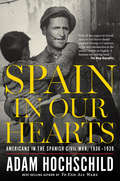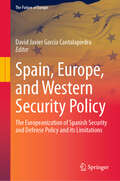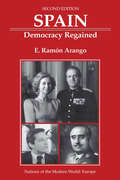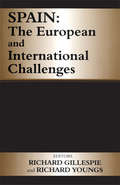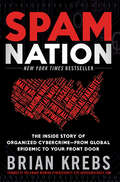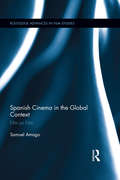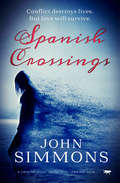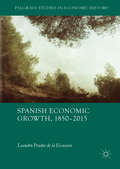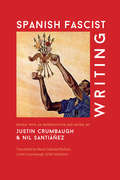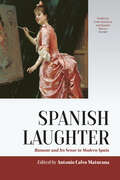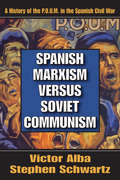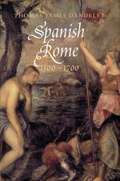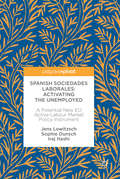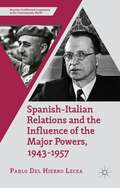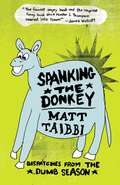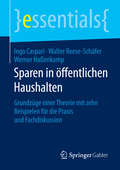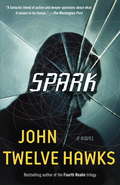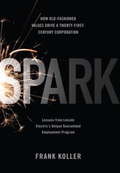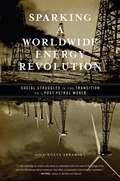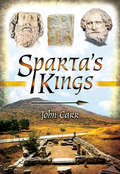- Table View
- List View
Spain in Our Hearts: Americans in the Spanish Civil War, 1936–1939
by Adam HochschildFrom the acclaimed, best-selling author Adam Hochschild, a sweeping history of the Spanish Civil War, told through a dozen characters, including Ernest Hemingway and George Orwell: a tale of idealism, heartbreaking suffering, and a noble cause that failed For three crucial years in the 1930s, the Spanish Civil War dominated headlines in America and around the world, as volunteers flooded to Spain to help its democratic government fight off a fascist uprising led by Francisco Franco and aided by Hitler and Mussolini. Today we're accustomed to remembering the war through Hemingway’s For Whom the Bell Tolls and Robert Capa’s photographs. But Adam Hochschild has discovered some less familiar yet far more compelling characters who reveal the full tragedy and importance of the war: a fiery nineteen-year-old Kentucky woman who went to wartime Spain on her honeymoon, a Swarthmore College senior who was the first American casualty in the battle for Madrid, a pair of fiercely partisan, rivalrous New York Times reporters who covered the war from opposites sides, and a swashbuckling Texas oilman with Nazi sympathies who sold Franco almost all his oil — at reduced prices, and on credit. It was in many ways the opening battle of World War II, and we still have much to learn from it. Spain in Our Hearts is Adam Hochschild at his very best.
Spain, Europe, and Western Security Policy: The Europeanization of Spanish Security and Defense Policy and its Limitations (The Future of Europe)
by David Javier García CantalapiedraThis book analyzes the limitations in the Europeanization of Spanish security and defense policy. For various reasons, Spain has maintained an amalgamated security system based on agreements with NATO, the EU and the US. This combination has produced a dysfunctional system, as it is not truly able to address some of the country’s vital security interests, above all in North Africa and the Mediterranean. At the same time, due mainly to domestic reasons, various Spanish governments have been reluctant to pursue autonomy in the country’s security policy and defense capabilities. Written by a team of scholars and practitioners, this book offers policymakers and professionals both a general overview of and deeper insights into the issue. Due to the lack of comprehensive studies on Spanish security and defense policy and its ties to Europe, this book will be of particular interest.
Spain: Democracy Regained, Second Edition
by E. Ramon ArangoSince the death of Franco in 1975, Spain has passed from repression through renewal to democracy, restored for the first time since 1936. Having survived the threat to its very existence in 1981, democratic Spain-now a member of the European Union and the North Atlantic Treaty Organization-seems as secure as any of its European neighbours. The acce
Spain: The European and International Challenges
by Richard Gillespie Richard YoungsThis volume assesses the evolution of Spain's external relations during the 1990s, within and beyond Europe, and assesses the principal challenges facing the country at the beginning of the twenty-first century. The coincidence of several crucial global and European developments has had a profound effect on Spain. Adjustment of the economy and changes in foreign policy perspectives have become unavoidable. In turn, Spain, as an increasingly self-confident member of the EU, has itself become a significant actor in European-level developments. Spain's relationship with Europe and the wider world is increasingly balanced between new constraints and new opportunities for international influence.
Spam Nation: The Inside Story of Organized Cybercrime—from Global Epidemic to Your Front Door
by Brian KrebsA New York Times bestseller and winner of a 2015 Prose Award!There is a threat lurking online. A secret war with the power to destroy your finances, steal your personal data, and endanger your life.In Spam Nation, investigative journalist and cybersecurity expert Brian Krebs unmasks the criminal masterminds driving some of the biggest spam and hacker operations targeting Americans and their bank accounts. Tracing the rise, fall, and alarming resurrection of the digital mafia behind the two largest spam pharmacies—and countless viruses, phishing, and spyware attacks—he delivers the first definitive narrative of the global spam problem and its threat to consumers everywhere.Blending cutting-edge research, investigative reporting, and firsthand interviews, this terrifying true story reveals how we unwittingly invite these digital thieves into our lives every day. From unassuming computer programmers right next door to digital mobsters like "Cosma"—who unleashed a massive malware attack that has stolen thousands of Americans' logins and passwords—Krebs uncovers the shocking lengths to which these people will go to profit from our data and our wallets.Not only are hundreds of thousands of Americans exposing themselves to fraud and dangerously toxic products from rogue online pharmacies, but even those who never open junk messages are at risk. As Krebs notes, spammers can—and do—hack into accounts through these emails, harvest personal information like usernames and passwords, and sell them on the digital black market. The fallout from this global epidemic doesn't just cost consumers and companies billions, it costs lives too.Fast-paced and utterly gripping, Spam Nation ultimately proposes concrete solutions for protecting ourselves online and stemming this tidal wave of cybercrime—before it's too late."Krebs's talent for exposing the weaknesses in online security has earned him respect in the IT business and loathing among cybercriminals… His track record of scoops...has helped him become the rare blogger who supports himself on the strength of his reputation for hard-nosed reporting." —Bloomberg Businessweek
Spanish Cinema in the Global Context: Film on Film (Routledge Advances in Film Studies #26)
by Samuel AmagoAcross a broad spectrum of media, markets, and national contexts, self-reflexivity continues to be a favored narrative mode with wide ranging functions. In this book Amago argues that, in addition to making visible industry and production concerns within the film text, reflexive aesthetics have a cartographic function that serves to map the place of a film (geographic and cultural) within the global cinemascape, and thus to bring into sharper relief images of the national. Focusing on films in the contemporary Spanish context that in some way reflect back on themselves and the processes of their own production, that purposefully blur the distinction between reality and fiction, or that draw attention to the various modes of cinematic exhibition and reception, Amago proposes ways in which these movies can be employed to understand Spanish national cinemas today as imbedded within a dynamic global system.
Spanish Crossing: A Gripping Novel about Love, Loss and Hope
by John SimmonsThe Spanish Civil War casts a shadow over a London woman’s life as she grows increasingly attached to a young Basque refugee . . .After Lorna, a legal secretary, meets and falls in love with Harry, a member of the International Brigade, he is tragically killed in the fighting in Spain—and Lorna fears she might have lost her best chance of happiness. To fill the void in her life, she focuses on helping the child refugees of the conflict, newly arrived in England on a boat from Bilbao. As Lorna discovers a connection to one boy, Pepe, their lives become increasingly intertwined in the postwar rebuilding of London after the bombing raids of World War II. But Pepe remains deeply pulled towards the homeland and family that have been placed beyond his reach—and their relationship will be tested by the tragic history they share . . .From the author of The Good Messenger, Spanish Crossings is an epic tale of love, politics, the human connection that crosses all borders, and the yearning but elusive possibility of redemption.
Spanish Economic Growth, 1850–2015
by Leandro Prados de la EscosuraThis book is open access under a CC BY 4. 0 license. This text offers a comprehensive and nuanced view of the economic development of Spain since 1850. It provides a new set of historical GDP estimates for Spain from the demand and supply sides, and presents a reconstruction of production and expenditure series for the century prior to the introduction of modern national accounts. The author splices available national accounts sets over the period 1958-2015 through interpolation, as an alternative to conventional retropolation. The resulting national accounts series are linked to the historical estimates providing yearly series for GDP and its components since 1850. On the basis of new population estimates, the author derives GDP per head, decomposed into labour productivity and the amount of work per person, and placed into international perspective. With theoretical reasoning and historiographical implications, Prados de la Escosura provides a useful methodological reference work for anyone interested in national accounting. 'This book stands among the classics for the Kuznetian paradigm in empirical economics. This is the definitive study of Spain's transition to a modern economy. ' --Patrick Karl O'Brien, Emeritus Fellow at St. Antony's College, the University of Oxford, UK, and Professor Emeritus of Global Economic History at the London School of Economics and Political Science, UK 'The definitive account of Spanish economic growth since 1850, based firmly on a magisterial reconstruction of that country's national accounts and an unrivalled knowledge of both Spanish and global economic history of the period. ' --Stephen Broadberry, Professor of Economic History at Nuffield College, the University of Oxford, UK
Spanish Fascist Writing (Toronto Iberic)
by Nil Santianez Justin CrumbaughSpanish Fascist Writing presents the first collection of Spanish fascist texts in English translation and offers an intellectual and political history of fascist writing in Spain, a history that resituates the country within the larger unfolding of right-wing extremism worldwide from the early twentieth century to the present. The manifestos, newspaper articles, essays, letters, and pieces of prose fiction gathered in this volume demonstrate why the Spanish case proves essential to a comprehensive understanding of fascism in general. These Spanish fascist texts also highlight the need for comparative analysis in order to better grasp the transnational character of fascism, fascism’s profound roots in colonialism, fascism’s multiple temporalities, and the rise in recent years of right-wing extremism throughout the world. In short, Spanish Fascist Writing takes Spain from the margins to the forefront of fascist studies.
Spanish Laughter: Humor and Its Sense in Modern Spain (Studies in Latin American and Spanish History #9)
by Antonio Calvo MaturanaWhy and what have we laughed at in the last two centuries? Is humor merely a means of provoking laughter and entertainment, or of communicating deeper ideas? What are and have been its limits? Spanish Laughter answers these and many other questions through an interdisciplinary study of Spanish humor from the Enlightenment to the present day, analyzing everything from literature and political satire to film and social networks.
Spanish Marxism versus Soviet Communism: A History of the P.O.U.M. in the Spanish Civil War
by Victor AlbaSpanish Marxism Versus Soviet Communism is the first historical study of the P.O.U.M. to appear in English. Drawing from his multi-volume work on the subject, which was published in Spanish and Catalan, Victor Alba has collaborated with Stephen Schwartz to produce a condensed and amplified study that is far more than a translation.Outside Spain, the political movement known as the Workers Party of Marxist Unification (Partido Obrero de Unificacion Marxist or P.O.U.M.) is chiefly known as the revolutionary group with which George Orwell fought during the Spanish Civil War of the 1930s. The events in which the P.O.U.M. found itself at the center of conflict between Iberian revolutionaries and Soviet interests remain a controversial topic for historians and other writers. This book presents a detailed picture of the organization and its main antecedent, the Workers' and Peasants' Bloc, in the context of a stimulating working class political culture.Those interested in Catalan history as well as historians of Western European Marxism and the Spanish Civil War will find this book useful. It will also be of interest to those concerned with Orwell and his experience in Spain. A fitting tribute to the P.O.U.M.'s great struggle against Stalinism, Spanish Marxism Versus Soviet Communism will surely stand out among the array of books that have been published on the Spanish Civil War period as a definitive study.
Spanish Rome, 1500-1700
by Thomas James DandeletRome was an old but vigorous remnant of its ancient imperial glory, rich in religious authority; Spain was a rising giant on the road to becoming the world's first modern global empire, rich in New World gold. Dandelet (history, U. of California-Berkeley) tells the story of interaction between the two empires during the 16th and 17th centuries.
Spanish Sociedades Laborales—Activating the Unemployed
by Jens Lowitzsch Sophie Dunsch Iraj HashiThis book investigates the potential of the Spanish Sociedades Laborales (SLs) as an instrument of active labour market policy for re-turning the unemployed to the labour market and also the transferability of the scheme to other EU Member States. Spanish Sociedades Laborales (SLs) - mostly small and micro enterprises - are a qualified form of conventional corporation, majority-owned by their permanent employees. Unemployed persons can capitalise their unemployment benefits as a lump sum to start a new SL or to recapitalise an existing SL by joining it. This makes SLs similar to start-up subsidies for the unemployed, an established instrument of active labour market policy across the EU. The new 2015 Law on Worker-Owned and Participatory Companies substantially modernised the concept of SLs 30 years after its inception. The book tackles two currently widely discussed policy issues at both the EU level as well as the national level, i. e. , reactivating unemployed in the context of ALMP and encouraging employee co-ownership in the context of the economic reform agenda in particular with regard to corporate governance, regional economic stimuli and distributive justice.
Spanish-Italian Relations and the Influence of the Major Powers, 1943-1957
by Pablo Del Hierro LeceaSpanish-Italian Relations and the Influence of the Major Powers examines complex relations between Spain and Italy, beginning in 1943 and continuing until 1957, contending that the relationship cannot be examined in isolation and must be understood in its broader context.
Spanking the Donkey: Dispatches from the Dumb Season
by Matt Taibbi"Spanking the Donkey" indicts the surreal irrelevance of today's mainstream politics with barbed wit and caustic intelligence. Follow Taibbi as he covers the primary for the 2004 presidential election, joining him for a spot on John Kerry's campaign plane, face-to-face encounters with John Edwards's pancake makeup, and more.
Spannungsfeld zwischen Fachkräftemangel und Wohnungsmangel: Mitarbeiterwohnungen als Lösungsansatz (Studien zum nachhaltigen Bauen und Wirtschaften)
by Thomas Glatte Mona BalkenholVor dem Hintergrund des aktuell herrschenden Wohnungsmangels und dem Mangel an Fachkräften in Deutschland werden Mitarbeiterwohnungen wieder neu entdeckt. Diese Publikation untersucht die Mitarbeiterwohnungen als passenden Lösungsansatz in dem Spannungsfeld zwischen Fachkräftemangel und Wohnungsmangel. Hierbei werden erste Einblicke in die Wahrnehmung von Akademikern der Generation Z in Bezug auf Mitarbeiterwohnungen gewährt. Ebenso stellt die Publikation Erkenntnisse für eine Steigerung der Arbeitgeberattraktivität gegenüber jungen Arbeitnehmern dar.
Spare
by Prince Harry The Duke of SussexIt was one of the most searing images of the twentieth century: two young boys, two princes, walking behind their mother’s coffin as the world watched in sorrow—and horror. As Princess Diana was laid to rest, billions wondered what Prince William and Prince Harry must be thinking and feeling—and how their lives would play out from that point on. <p><p>For Harry, this is that story at last.Before losing his mother, twelve-year-old Prince Harry was known as the carefree one, the happy-go-lucky Spare to the more serious Heir. Grief changed everything. He struggled at school, struggled with anger, with loneliness—and, because he blamed the press for his mother’s death, he struggled to accept life in the spotlight. <p><p>At twenty-one, he joined the British Army. The discipline gave him structure, and two combat tours made him a hero at home. But he soon felt more lost than ever, suffering from post-traumatic stress and prone to crippling panic attacks. Above all, he couldn’t find true love. Then he met Meghan. <p><p>The world was swept away by the couple’s cinematic romance and rejoiced in their fairy-tale wedding. But from the beginning, Harry and Meghan were preyed upon by the press, subjected to waves of abuse, racism, and lies. Watching his wife suffer, their safety and mental health at risk, Harry saw no other way to prevent the tragedy of history repeating itself but to flee his mother country. <p><p>Over the centuries, leaving the Royal Family was an act few had dared. The last to try, in fact, had been his mother. . . . <p><p>For the first time, Prince Harry tells his own story, chronicling his journey with raw, unflinching honesty. A landmark publication, Spare is full of insight, revelation, self-examination, and hard-won wisdom about the eternal power of love over grief. <p> <b>New York Times Bestseller</b>
Spare
by Prince Harry, The Duke of SussexIt was one of the most searing images of the twentieth century: two young boys, two princes, walking behind their mother&’s coffin as the world watched in sorrow—and horror. As Princess Diana was laid to rest, billions wondered what Prince William and Prince Harry must be thinking and feeling—and how their lives would play out from that point on.For Harry, this is that story at last.Before losing his mother, twelve-year-old Prince Harry was known as the carefree one, the happy-go-lucky Spare to the more serious Heir. Grief changed everything. He struggled at school, struggled with anger, with loneliness—and, because he blamed the press for his mother&’s death, he struggled to accept life in the spotlight. At twenty-one, he joined the British Army. The discipline gave him structure, and two combat tours made him a hero at home. But he soon felt more lost than ever, suffering from post-traumatic stress and prone to crippling panic attacks. Above all, he couldn&’t find true love.Then he met Meghan. The world was swept away by the couple&’s cinematic romance and rejoiced in their fairy-tale wedding. But from the beginning, Harry and Meghan were preyed upon by the press, subjected to waves of abuse, racism, and lies. Watching his wife suffer, their safety and mental health at risk, Harry saw no other way to prevent the tragedy of history repeating itself but to flee his mother country. Over the centuries, leaving the Royal Family was an act few had dared. The last to try, in fact, had been his mother. . . .For the first time, Prince Harry tells his own story, chronicling his journey with raw, unflinching honesty. A landmark publication, Spare is full of insight, revelation, self-examination, and hard-won wisdom about the eternal power of love over grief.
Spare: En la sombra
by Príncipe Harry, duque de SussexFue una de las imágenes más desgarradoras del siglo XX: dos niños, dos príncipes, caminando detrás del féretro de su madre mientras el mundo contemplaba la escena con pesar... y horror. A la vez que se daba sepultura a Diana, princesa de Gales, miles de millones de personas se preguntaron qué debían de pensar y sentir esos príncipes y qué rumbo tomarían sus vidas en adelante. En el caso de Harry, esta es, por fin, esa historia. Con su franqueza directa y sin concesiones, En la sombra es una publicación que marcará un hito, llena de lucidez, revelaciones, introspección y sabiduría, adquirida a un alto coste, sobre el eterno poder del amor.
Sparen in öffentlichen Haushalten: Grundzüge einer Theorie mit zehn Beispielen für die Praxis und Fachdiskussion (essentials)
by Ingo Caspari Walter Reese-Schäfer Werner HaßenkampDie Autoren beschreiben in diesem Essential anhand von Beispielen Schwierigkeiten, die beim Sparen auftreten. Auf Basis der Systemtheorie des Soziologen N. Luhmann, die zu Grundzügen einer Soziologie des Sparens umgeformt wird, entstehen neue Einblicke, weil in Systemen (wie Wirtschaft oder Politik) gedacht wird und der einzelne Mensch außen vor bleibt. Die Aggregation der Erkenntnisse der Beispiele aus der Praxis mündet in einer Frage: Wie sollen die gesellschaftlichen Subsysteme um die beste Lösung streiten? Hier stößt das Analysewerkzeug Systemtheorie an seine Grenzen und die Theorie kommunikativer Vernunft von J. Habermas führt zu klaren Empfehlungen an die Praxis des Sparens. Zentrale zukünftige Herausforderungen werden abschließend benannt.
Spark
by John Twelve HawksTHE MOST DANGEROUS ASSASSIN IS THE ONE WHO BELIEVES HE IS ALREADY DEAD.A razor-sharp, high-tech, wildly imaginative new novel from internationally bestselling author John Twelve Hawks, Spark features a narrator unlike any in recent fiction--a man whose view of life and death is different from anything you've ever imagined. Jacob Underwood is a contract employee of the Special Services Section, a small shadow department buried within the multinational corporation DBG, headquartered in New York City. Jacob is not a businessman . . . he is a hired assassin . . . and his job is to neutralize problems deemed unacceptable by the corporation. But Jacob is not like other employees, nor is he like other people. After a catastrophic motorcycle accident leaves him with Cotard's syndrome--an actual condition that causes those afflicted to believe they are dead--Jacob perceives himself as nothing but a "Shell," with no emotions and no tether to the concept of right and wrong. Emily Buchanan is a bright young second-year associate for DBG, and she has disappeared without a trace. Suspecting that Emily has stolen either vast sums of money or valuable information from the company, Ms. Holquist, Jacob's handler at DBG, assigns him the task of tracking down the young woman and neutralizing her. Jacob's condition allows him to carry out assignments with ruthless, logical precision, devoid of guilt, fear, or dishonor. But as his new assignment draws him inside a labyrinthine network of dark dealings, Jacob finds himself up against something he is completely incapable of understanding. Shifting with riveting precision from New York to London, Paris to New Delhi, Spark is a thriller that delves into the surveillance state we prognosticate today . . . and will live in tomorrow. In the hands of master storyteller John Twelve Hawks, a unique character's startling transformation comes to life, making Spark a thriller that resonates and satisfies on many levels.From the Hardcover edition.
Spark: How Old-Fashioned Values Drive a Twenty-First-Century Corporation: Lessons from Lincoln Electric's U
by Frank KollerWhile factories across the Midwest shutter their doors, Cleveland-based manufacturer Lincoln Electric has thrived for more than a century. In addition to being profitable and technologically innovative, through good times and bad, the company has fulfilled its unique promise of "guaranteed continuous employment. ” Workers are viewed as assets-not liabilities. Through flexible hours and job assignments, as well as a merit-based bonus system, Lincoln Electric’s employment policies have proven healthy for the company’s bottom line its employees and its shareholders. In Spark, veteran journalist Frank Koller tells the story of how this unusual and profitable Fortune 1000 multinational company challenges the conventional wisdom shaping modern management’s view of the workplace. Through insightful storytelling and extensive interviews with executives, workers, and leading business thinkers, Koller uses the Lincoln Electric example to illustrate how job security can inspire powerful growth and prosperity in our communities.
Sparking a Worldwide Energy Revolution
by Kolya AbramskyAs the earth's carrying capacity continues to be stressed, the question of renewable energies is no longer whether, but when and by whom. Climate change and peak oil have hit the mainstream. Kolya Abramsky's collection maps the world's energy sector and shows how addressing these challenges necessitates an analysis of our economic priorities. Solutions must include massive shifts in our use of technologies and, most importantly, a democratization of the economic landscape based on broad new coalitions.With four distinct sections-Oil Makes the World Go 'Round; From Petrol to Renewable Energies; Struggle Over Choice of Energy Sources and Technologies; and Possible Futures-and over fifty essays from approximately twenty countries, there's nothing like Sparking a Worldwide Energy Revolution to address our global energy crisis.The different chapters bring together a wealth of organizational and analytical experience from across the different branches of the energy sector, both conventional and renewable. Contributors include the following organizations and individuals: China Labour Bulletin (Hong Kong/China), Energy Watch Group (Germany), Focus on the Global South (Thailand), Integrated Sustainable Energy and Ecological Development (India), Public Services International Research Unit (United Kingdom), World Information Service on Energy (Netherlands), Preben Maegaard, and Hermann Scheer.Kolya Abramsky is a former secretariat of the World Wind Energy Institute, based in Denmark, a pioneering country in renewable energy. He is currently a research fellow at the Institute for Advanced Studies on Science, Technology and Society in Austria, and is pursuing a PhD in sociology at State University of New York, Binghamton.
Sparrowhawk IV: Empire
by Edward ClineConflicts between the colonials themselves and with the mother country reveal the contest of wills between reason and greed, pride and hubris, on the road to the American Revolution.
Sparta's Kings
by John CarIn ancient Greece, Sparta was unique in having a dual kingship two kings from different clans, the Agiads and the Eurypontids, reigning simultaneously. The institution was already well-developed by the 8th century BC, when Theopompos of the Eurypontid clan emerges as the first recorded Spartan king. At least fifty-seven men held office as Spartan king between Theopompos and the Agiad Kleomenes III who died in 222 BC. For almost all this period the Spartan kingship was primarily a military office, and thus the kings embody much of the military history of Sparta. Wherever Spartas main battles took place, there the kings were. Naturally, the character of the particular king would often determine the outcome of a battle or campaign. Leonidas I at Thermopylai was one example. At the other end of the scale the young and unwar-like Pleistoanax twice declined an encounter with the Athenians when sent against that city.John Carr offers a chronological account of the kings and their accomplishments (or lack thereof), from the founding Herakleidai clan to Kleomenes III and his successor, the dictator Nabis, and the Roman conquest in the middle of the 2nd century BC. The book is not intended to be a complete history of Sparta. It will be a human interest and war story, focusing attention on the kings personal qualities as well as their (or their generals) military accomplishments and, where applicable, their politics as well.
